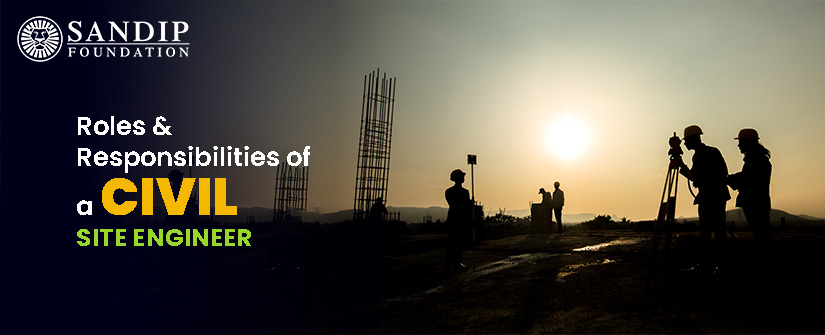Civil engineering is a very vast and dynamic field with many career opportunities. Being a civil site engineer has a myriad of roles and responsibilities as a part of their job profile. A career in civil engineering can be very lucrative. However, you will have to obtain the right qualifications, skills, and training to make it in the field as it is highly competitive. Let us take a look at what a civil site engineer is and the kind of roles and responsibilities they have on the job.
What is a Civil Site Engineer?
A civil site engineer is someone who oversees and manages the day-to-day operations of different projects. They often have to manage different projects at the same time so it is a highly skill-intensive and detail-oriented profession. Civil site engineers are recruited by government organisations and private firms to oversee the construction of different projects like residential and commercial buildings, roadways, dams, railways, ports, and much more.
Civil site engineers have to have a vast range of skills in their arsenal as their work environment consists of different elements. Besides overseeing different civil construction sites, they also have to conduct meetings, presentations, and manage necessary paperwork depending on the site in question. If you are someone who can work in a high-pressure and time-sensitive environment, then becoming a civil site engineer could be the right profession for you.
Roles and Responsibilities of Civil Site Engineers
1. Overseeing a Construction Site
Civil site engineers have to be highly proficient regarding managing a construction site. They have to be skilled in different tasks like drawing up budgets, raw materials, conditions of work, health and safety of workers, and dealing with upper management. They have to provide a clear picture of the progress of each construction site to upper management so that they can be regularly updated regarding the progress of a project.
2. Travelling Between Sites
A civil site engineer has to oversee and manage different kinds of construction sites at the same time. They have to travel between different sites regularly and be aware of the needs of each site. They also have to procure necessary resources, manage the workers, avoid discrepancies in the budget, and execute the vision of the project accurately. If you wish to have a desk job then becoming a civil site engineer is not the job for you.
3. Technical Duties
Since civil site engineers are highly skilled and trained professionals, they have a range of technical duties to conduct on a civil construction site. They have to oversee the structural design of a project, check with the progress of the project, make sure that the right materials are used to ensure the longevity of the structure, and deal with any issues that may arise at the project on a daily basis. They have to conduct such technical duties efficiently to avoid any issues in the project.
4. Preparing Reports and Schedules
A civil site engineer has to ensure that the required amount of raw material is available at the site to complete different tasks related to the project. This will mean drawing up schedules where raw materials can be delivered to the site, and schedules for workers regarding their work shifts. They also have to draft necessary reports to submit to upper management so that they have a clear picture regarding the progress of the project.
5. Overseeing Safety Protocols
Safety on a civil construction site is of utmost importance as a large number of people work on the site under hazardous conditions. Loose cement, debris, metal components, cranes, and rocks need to be managed properly on the construction site to avoid accidents and potential loss of life on the site. Implementation of health and safety protocols are one of the main responsibilities of a civil site engineer to create a positive working environment for all workers on the site.
6. Quality Assurance
Constructing any civil structure needs to pass a certain quality inspection to be viable for human use. In the event that improper or low-quality materials are used for construction, the structure will not be able to withstand for long periods of time, and could even collapse. To avoid this, civil site engineers have to be constantly vigilant regarding the materials used for construction, ensuring that the professionals involved in the construction are skilled to accomplish the task at hand.
7. Communicating with Teammates
Civil site engineers have to interact with a wide range of people ranging from daily construction labourers to upper management running the project. Besides having excellent technical skills, these professionals also need to have good communication skills to communicate efficiently with their teammates and the upper management simultaneously. This is one of the main site engineer responsibilities today.
Conclusion
Now that you are aware about the roles and responsibilities of a civil site engineer, you can obtain the right qualifications from the best civil engineering college in Nashik to do the job well. It is a bright profession with a lot of scope. Do some research and pick the right college that aligns with your career goals. Good luck!

